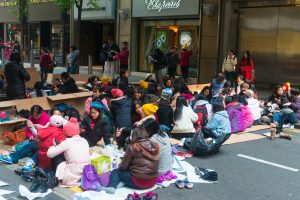Tens of thousands of foreign domestic workers in Hong Kong are scrambling to undergo COVID-19 screenings this weekend before the government’s Sunday deadline for mandatory testing – a policy slammed by migrant rights groups as discriminatory.
The government received swift backlash after announcing compulsory testing and vaccination policies last week for the city’s 370,000 domestic workers, but not for other non-resident migrants such as the city’s white-collar financial workers. Since the pandemic began, domestic helpers in Hong Kong and elsewhere in the region have been blamed for outbreaks and are now facing growing discrimination, according to activists.
On Tuesday, authorities suspended the measure to make vaccinations mandatory but remained firm on compulsory testing, saying the move is necessary due to the prevalence of more virulent mutated strains. Officials say domestic workers are “high risk” because they enter from abroad and gather in large numbers on Sunday, their one day off in the week. Five helpers were found to be carrying mutated strains, with three identified through mass testing, the South China Morning Post reports.
“The new policy is discriminatory because it singles out migrant domestic workers in Hong Kong,” said Dolores Balladares, chairperson of the rights group United Filipinos in Hong Kong. “We always say we’re not virus carriers (but that’s) what the government implied in their actions. We are treated unfairly. We’re punished and criminalized by the new policies.”
Prior to the temporary suspension of the vaccination requirement, both the Indonesian and Filipino consulates spoke out against the measures, arguing that such rules should apply to all non-resident workers if they are to be implemented. Domestic helpers filed a complaint with the Equal Opportunities Commission accusing the government of discrimination, but the watchdog’s chairman said the measures aim to protect public health and thus “should be lawful.”
Employment agencies also report that some have expressed concerns about such policies forcing workers to leave the city, leading to a potential labor drain, The Standard reports. Other employers are worried about liability issues that may arise should helpers suffer from complications after vaccination, since the coronavirus is not considered an occupational disease.
Domestic workers – mostly female and from the Philippines, Indonesia, and other Southeast Asian countries – are required to live with their employers. For over a year now, many have been prevented from social gatherings with friends, as a result of continuous lockdowns to contain the spread of the virus. In addition to shouldering extra cleaning work, some have also been forced to pay out of pocket for masks, alcohol gel, and other PPE.
Cases of abuse are also rising, activists say. According to a study by the Mission For Migrant Workers released last month, 17 percent of workers reported being physically abused or assaulted last year, up by 2 percentage points since 2019. Reports of rape or sexual abuse also increased from 2 to 6 percent. About 98 percent reported working longer hours, with about 40 percent reportedly being made to work during their days of rest and holidays.
“From (our) slave wages as the lowest earners in the city, bonded to live where there’s no freedom… we are prone to many abuses inside the house,” said Realizza Otarra, a domestic helper and chairperson of the Filipino Migrant Workers’ Union. Activists have long campaigned for workers to be able to live independently from employers. “We’ve already been vulnerable before the pandemic. The situation has now worsened.”
Hong Kong authorities and the home governments of migrant workers should work together to provide financial aid, PPE, and other resources for helpers in the city, activists say. Authorities should also improve public education on domestic worker issues in addition to expanding access to information and health services for this at-risk group, who often do not qualify for various welfare schemes due to their employment status.
For Otarra, who herself has experienced coronavirus-related discrimination and has seen many fellow domestic workers lose their jobs, the pandemic has been a devastating time. Hong Kong needs to treat workers as part of local society, both in the fight against the virus and more generally, she said.
“Migrant domestic workers are also human beings,” Otarra said. “Let’s bear that in mind.”

































